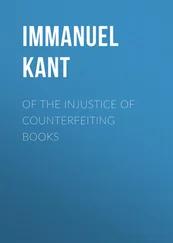The thesis might also have been unfairly demonstrated, by the introduction of an erroneous conception of the infinity of a given quantity. A quantity is infinite, if a greater than itself cannot possibly exist. The quantity is measured by the number of given units — which are taken as a standard — contained in it. Now no number can be the greatest, because one or more units can always be added. It follows that an infinite given quantity, consequently an infinite world (both as regards time and extension) is impossible. It is, therefore, limited in both respects. In this manner I might have conducted my proof; but the conception given in it does not agree with the true conception of an infinite whole. In this there is no representation of its quantity, it is not said how large it is; consequently its conception is not the conception of a maximum. We cogitate in it merely its relation to an arbitrarily assumed unit, in relation to which it is greater than any number. Now, just as the unit which is taken is greater or smaller, the infinite will be greater or smaller; but the infinity, which consists merely in the relation to this given unit, must remain always the same, although the absolute quantity of the whole is not thereby cognized.
The true (transcendental) conception of infinity is: that the successive synthesis of unity in the measurement of a given quantum can never be completed. 53 Hence it follows, without possibility of mistake, that an eternity of actual successive states up to a given (the present) moment cannot have elapsed, and that the world must therefore have a beginning.
In regard to the second part of the thesis, the difficulty as to an infinite and yet elapsed series disappears; for the manifold of a world infinite in extension is contemporaneously given. But, in order to cogitate the total of this manifold, as we cannot have the aid of limits constituting by themselves this total in intuition, we are obliged to give some account of our conception, which in this case cannot proceed from the whole to the determined quantity of the parts, but must demonstrate the possibility of a whole by means of a successive synthesis of the parts. But as this synthesis must constitute a series that cannot be completed, it is impossible for us to cogitate prior to it, and consequently not by means of it, a totality. For the conception of totality itself is in the present case the representation of a completed synthesis of the parts; and this completion, and consequently its conception, is impossible.
On the Antithesis.
The proof in favour of the infinity of the cosmical succession and the cosmical content is based upon the consideration that, in the opposite case, a void time and a void space must constitute the limits of the world. Now I am not unaware, that there are some ways of escaping this conclusion. It may, for example, be alleged, that a limit to the world, as regards both space and time, is quite possible, without at the same time holding the existence of an absolute time before the beginning of the world, or an absolute space extending beyond the actual world — which is impossible. I am quite well satisfied with the latter part of this opinion of the philosophers of the Leibnitzian school. Space is merely the form of external intuition, but not a real object which can itself be externally intuited; it is not a correlate of phenomena, it is the form of phenomena itself. Space, therefore, cannot be regarded as absolutely and in itself something determinative of the existence of things, because it is not itself an object, but only the form of possible objects. Consequently, things, as phenomena, determine space; that is to say, they render it possible that, of all the possible predicates of space (size and relation), certain may belong to reality. But we cannot affirm the converse, that space, as something self-subsistent, can determine real things in regard to size or shape, for it is in itself not a real thing. Space (filled or void) 54 may therefore be limited by phenomena, but phenomena cannot be limited by an empty space without them. This is true of time also. All this being granted, it is nevertheless indisputable, that we must assume these two nonentities, void space without and void time before the world, if we assume the existence of cosmical limits, relatively to space or time.
For, as regards the subterfuge adopted by those who endeavour to evade the consequence — that, if the world is limited as to space and time, the infinite void must determine the existence of actual things in regard to their dimensions — it arises solely from the fact that instead of a sensuous world, an intelligible world — of which nothing is known — is cogitated; instead of a real beginning (an existence, which is preceded by a period in which nothing exists), an existence which presupposes no other condition than that of time; and, instead of limits of extension, boundaries of the universe. But the question relates to the mundus phaenomenon, and its quantity; and in this case we cannot make abstraction of the conditions of sensibility, without doing away with the essential reality of this world itself. The world of sense, if it is limited, must necessarily lie in the infinite void. If this, and with it space as the a priori condition of the possibility of phenomena, is left out of view, the whole world of sense disappears. In our problem is this alone considered as given. The mundus intelligibilis is nothing but the general conception of a world, in which abstraction has been made of all conditions of intuition, and in relation to which no synthetical proposition — either affirmative or negative — is possible.
Second Conflict of Transcendental Ideas.
Thesis.
Every composite substance in the world consists of simple parts; and there exists nothing that is not either itself simple, or composed of simple parts.
Proof.
For, grant that composite substances do not consist of simple parts; in this case, if all combination or composition were annihilated in thought, no composite part, and (as, by the supposition, there do not exist simple parts) no simple part would exist. Consequently, no substance; consequently, nothing would exist. Either, then, it is impossible to annihilate composition in thought; or, after such annihilation, there must remain something that subsists without composition, that is, something that is simple. But in the former case the composite could not itself consist of substances, because with substances composition is merely a contingent relation, apart from which they must still exist as self-subsistent beings. Now, as this case contradicts the supposition, the second must contain the truth — that the substantial composite in the world consists of simple parts.
It follows, as an immediate inference, that the things in the world are all, without exception, simple beings — that composition is merely an external condition pertaining to them — and that, although we never can separate and isolate the elementary substances from the state of composition, reason must cogitate these as the primary subjects of all composition, and consequently, as prior thereto — and as simple substances.
Antithesis.
No composite thing in the world consists of simple parts; and there does not exist in the world any simple substance.
Proof.
Let it be supposed that a composite thing (as substance) consists of simple parts. Inasmuch as all external relation, consequently all composition of substances, is possible only in space; the space, occupied by that which is composite, must consist of the same number of parts as is contained in the composite. But space does not consist of simple parts, but of spaces. Therefore, every part of the composite must occupy a space. But the absolutely primary parts of what is composite are simple. It follows that what is simple occupies a space. Now, as everything real that occupies a space, contains a manifold the parts of which are external to each other, and is consequently composite — and a real composite, not of accidents (for these cannot exist external to each other apart from substance), but of substances — it follows that the simple must be a substantial composite, which is self-contradictory.
Читать дальше












